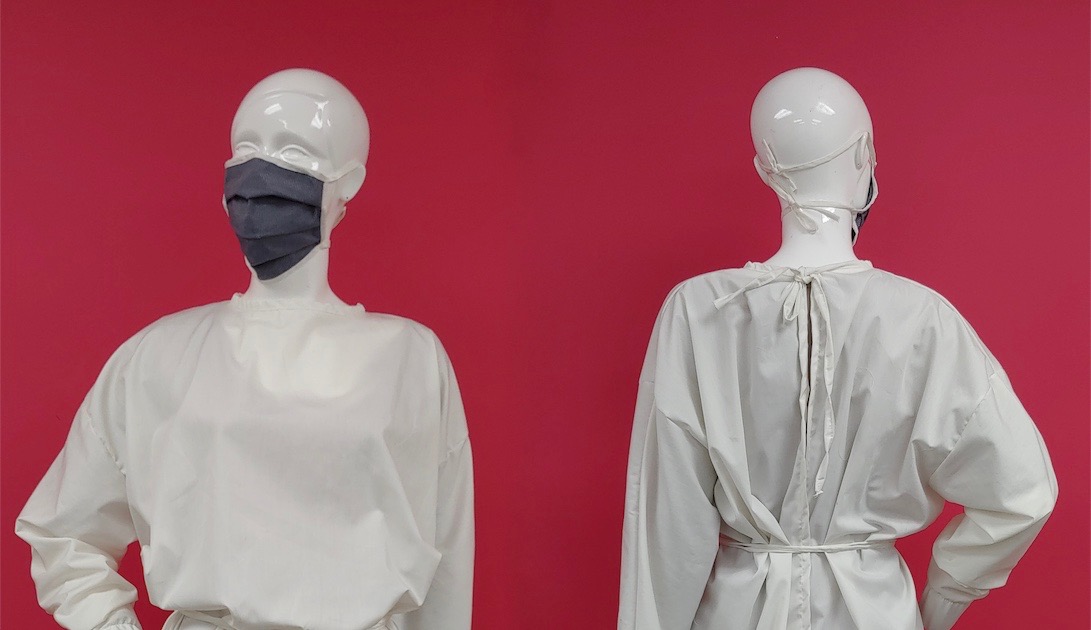Two local businesses have teamed up to get out of fashion design and into making personal protective equipment (PPE) to help address demands due to the coronavirus pandemic.

In just under four weeks, Carmina de Young, a clothing design company, and MLD Solutions Inc., have transitioned to the production of gowns and masks to address shortage due to COVID-19.
Carmina de Young handles the produce purchasing of material while MLD takes care of the business and marketing side of things.
Mona Lam-Deslippe, CEO of MLD, said it all started when she received an email about a fund to help business retool manufacturing to fight the spread of COVID-19.
Within two weeks of first receiving the email, Lam-Deslippe said they were able to start production.
“We started off hoping to support our local community, and that’s where our initial orders are coming from, but now we are in touch with other companies that have the large government contracts, so we are looking into the possibility of expanding into some of these contracts.”
On April 1, Ontario launched a $50-million fund to help businesses retool their production to produce medical equipment and personal protective gear for frontline workers.
Young had initially laid off her employees when the pandemic began, but since they started packing the PPE, she has been able to hire them all back.
The team creates non-medical gowns and Level 2 Protection gowns and masks with filter inserts, selling them at cost.
The women have also partnered with the London Middlesex Primary Care Alliance for guidance on design and fabrics and to connect with primary care physicians and their clinics.
Lam-Deslippe said getting the proper materials is a bit of challenge right now in Canada, but said at full capacity they will be able to make 700 gowns a week.
The World Health Organization estimates roughly 89 million medical masks will be needed worldwide each month for COVID-19 response.
On Monday, the Ontario government announced that it has acquired more than 13 million surgical and procedural masks, 200,000 N95 respirator masks, and 38 ventilators have been delivered to Ontario’s pandemic stockpile warehouses.
“The global competition to secure critical personal protective equipment and medical supplies is fierce, yet our team of procurement specialists continues to locate the masks, gloves and ventilators we need to keep our front-line workers and patients safe,” said Premier Doug Ford.
- ‘She gets to be 10’: Ontario child’s heart donated to girl the same age
- Bird flu risk to humans an ‘enormous concern,’ WHO says. Here’s what to know
- Buzz kill? Gen Z less interested in coffee than older Canadians, survey shows
- Shoppers faces proposed class action over claims company is ‘abusive’ to pharmacists
As of April 13, the province has received over 14,500 submissions from businesses and private citizens, offering to provide or donate various supplies and equipment, such as masks, face shields, testing equipment, ventilators, hand sanitizer, gowns and coveralls.
Questions about COVID-19? Here are some things you need to know:
Health officials caution against all international travel. Returning travellers are legally obligated to self-isolate for 14 days, beginning March 26, in case they develop symptoms and to prevent spreading the virus to others. Some provinces and territories have also implemented additional recommendations or enforcement measures to ensure those returning to the area self-isolate.
Symptoms can include fever, cough and difficulty breathing — very similar to a cold or flu. Some people can develop a more severe illness. People most at risk of this include older adults and people with severe chronic medical conditions like heart, lung or kidney disease. If you develop symptoms, contact public health authorities.
To prevent the virus from spreading, experts recommend frequent handwashing and coughing into your sleeve. They also recommend minimizing contact with others, staying home as much as possible and maintaining a distance of two metres from other people if you go out.
For full COVID-19 coverage from Global News, click here.














Comments